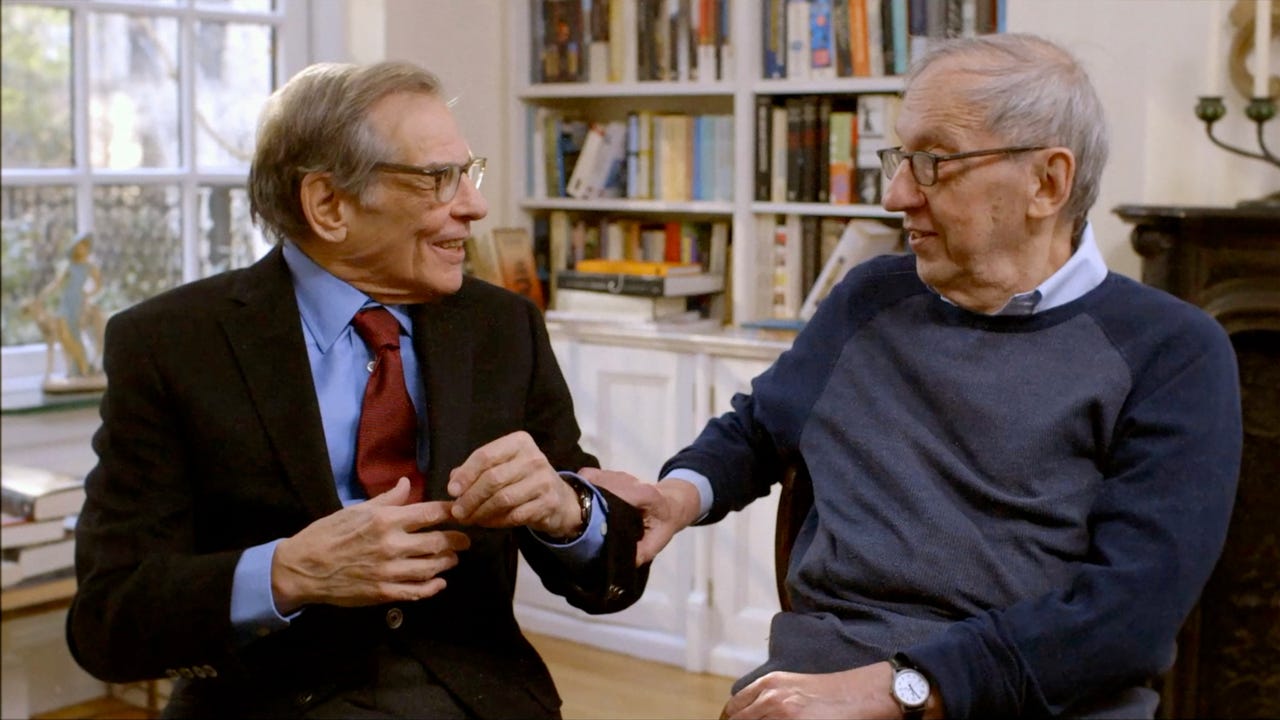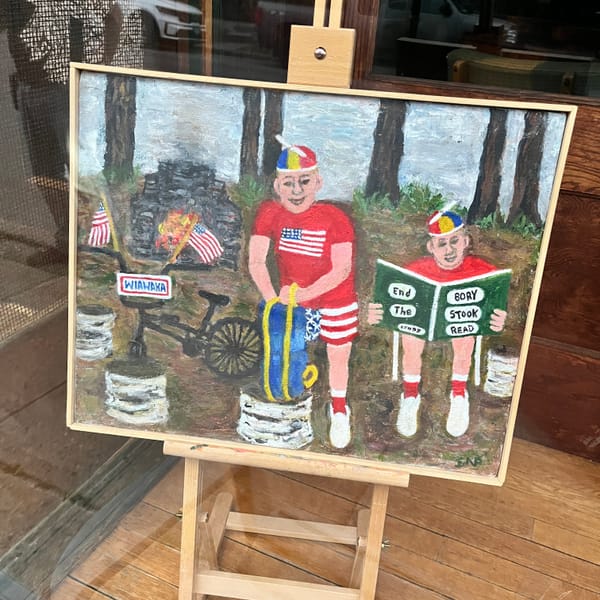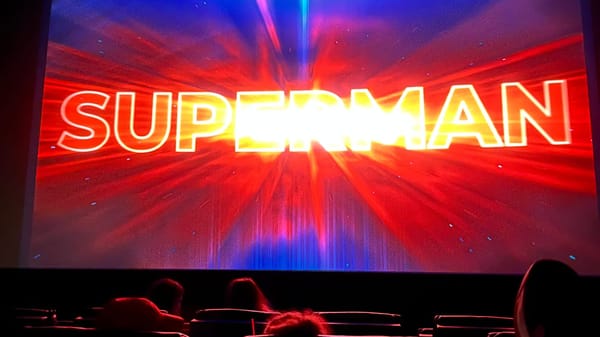Indignity, Vol. 2, No. 50: The sharpest pencil.
LITERATURE AND ALSO MOVIES DEP'T.

Watching The Adventures of Robert Caro and Robert Gottlieb
THE SUN WAS still shining when we got out of the early evening screening of Turn Every Page: The Adventures of Robert Caro and Robert Gottlieb at the Tribeca Festival. An old friend asked me how I was doing a little while ago, and I answered that I couldn't stop thinking about how we were using up our daylight, that even on the rise to the longest days of the year, my mind was already on the slide down to darkness. This was, I added, pretty obviously an expression of the awareness of aging and death, but understanding this didn't change how I felt about the days going by.
Robert Caro, the admired and beloved author of The Power Broker and of a prize-winning, still-unfinished multi-volume set of biographies of Lyndon Johnson, is 86. Robert Gottlieb, who has been, among many other things, the editor of Caro's enormous and slowly written books, is 91. Turn Every Page, made by Gottlieb's daughter Lizzie, quite directly addresses the fact that these men are running out of time, and that it is an open question whether they will be able complete their great joint project—an "actuarial" question, Robert Gottlieb says. It is a race between Caro's obsessive, methodical information-gathering habits and the matching, or greater, inexorability of the grave.
How is that race going? Both men are sharp and energetic on camera, showing no signs of being unprepared for the remaining work. At one point, though, the author shows the filmmaker the outline of his current Johnson book-to-be, tacked up on his office wall in rows of pages, then tells her he recently took down one whole row because he was done with that portion of the manuscript—a solid one-third of the book, he estimates. Caro seems happy with this progress report, but his desperate fans (whose desperation the movie swiftly but persuasively captures) can't be very comforted by the sight of all those pages of unfinished business still hanging there.
Still, Lizzie Gottlieb mentioned in the Q&A after the showing that most of the filming took place before the pandemic. So move a couple more years' worth of pages out of the unfinished two-thirds and into the finished portion, try not to think about the Zeno's-paradox nature of the project's expansion beyond Caro and Gottlieb's original three-volume plan, remember that LBJ himself didn't last very long after leaving the White House—it adds up to "maybe."
I didn't find myself worrying that much about the answer, and not just because I haven't gotten around to Caro's books myself. The story of the two Roberts in the movie raised far more haunting questions than whether the Johnson series does or doesn't get done—questions about meaning, and fulfillment, and the size that a person's ambitions or hopes can attain in this world, then and now and hereafter. It is charming and witty and entertaining and full of a sorrow that has very little to do with the fear of death per se.

The most powerful source of charm is Robert Gottlieb, disheveled and shockingly charismatic, whether in the present day or in archival images. Lizzie Gottlieb told the audience that the movie originated from her desire to make something that would show her admiration for her father, and his affection for her in return carries through the lens. But besides the obvious question of why anyone else should care about a child's love letter to a parent, the elder Gottlieb posed a structural and narrative problem: he has simply done too much, too well, for too long and across too many domains; he is not only the prolific editor of several eras’ worth of vital literary authors, and the editor of books by powerful and important public figures, but a writer himself, and a magazine editor, and a hugely perceptive and influential balletomane whose enthusiasm for George Balanchine led him onto the board of the New York City Ballet and now the Miami Ballet.
Rather than trying to cram all of those dealings with all of those geniuses into one account of her inexhaustible cultural fox of a father, the younger Gottlieb chose to tell the story of his relationship with a singular, monomaniacal hedgehog. Robert Caro is guarded and deliberate where his editor is breezy and intuitive, but Lizzie Gottlieb has the ear and the eye to capture how their individual characters bring them into harmony. Each of them, the film tells, translated an unhappy, frantically bookish upbringing into his life's calling, and for Caro, Robert Gottlieb brought the whirl of his professional life to a grinding standstill, hunkering down in an office for hours and days, armed with pencils, to wage siege warfare—alternately with and against his author—on the towering fortresses of his manuscripts. They recall the labor of hacking 350,000 words, a long book's worth of pages in its own right, out of the million-word draft of The Power Broker, to make it fit within the physical limit of its covers; the open-ended series of Lyndon Johnson volumes is, effectively, the compensation Caro wrung out of his publisher for that lost material.
Who does this sort of thing anymore? The arrangements that created and sustained their partnership—that kept the ideal pairing of author and editor fed and housed and free to collaborate through the decades—would be impossible today, Caro's agent Lynn Nesbit says in the film. It belongs to that maximal mid-century American realm of power and achievement that Caro dedicated his life to understanding and disenchanting; their literary project echoes the immensity and enormity of Robert Moses and Lyndon Johnson, in whose shadows they labored.
Diminishment, in many forms, is the great theme of the movie. Caro and his wife Ina, his lifelong fellow researcher, are welcomed to the Lyndon Johnson presidential library as the heroic authorities they are, but above them on the grand stairs loom (an overused word of Caro's, Robert Gottlieb tells the camera elsewhere, looming) shelves upon shelves upon shelves of red boxes of papers, floors of shelves, millions and millions of papers. Not even the Caros can read them all.
Amid the parade of famous figures attempting to describe the talismanic power of the work, meanwhile, there is Bill Clinton, snowy-haired and shrunken with age, trying to express to Lizzie Gottlieb what the LBJ books mean to him. They show, he says, how in our country a deeply flawed man, a man perhaps with base motives, may yet achieve great things. It is naked, abject pleading.
Clinton also confesses, with much less anguish, that Robert Gottlieb dumped him—that the editor told the ex-president that his planned book about his post–White House years wasn't going to be what it ought to be, and he didn't want to spend his remaining life working on it. The anxiety of living up to the moment, of being worth the time, creeps over everyone. David Remnick, the editor of the New Yorker (a position that Gottlieb briefly had but could not keep, though with winning immodesty he says it was an obvious fit for him) looks almost furtive as he tries, not quite successfully, to offer his own answer in the titans' long-running, intimidating dispute about the proper function of a semicolon.
And there is the filmmaker herself. Her father, with his limitless curiosity and energy, defined the shape of American literature; she is making a movie about her dad. She knows this, and with that knowledge, she has made it a gripping work of art.

PROMO DEP’T.
GOOD AFTERNOON! In our ongoing quest to provide you, the readers, with as much reading material as is feasible, about as many things as we are interested in, Indignity this week introduced a new section: the Wordle Postgame Report, in which we analyze the results of the previous day's edition of the popular five-letter-word-guessing game currently owned by the New York Times. In our ongoing quest to avoid needlessly annoying you, the readers, we did NOT deliver the Wordle Postgame Report to your email inboxes, on the grounds that many of you presumably do not play Wordle and therefore have no need or desire to read about the game.
Here is a TASTE of today’s edition. If you do not play Wordle, please AVOID this, and ENJOY your already complete Indignity-reading experience.

Wordle Postgame Report, June 16: _ _ _ _ _
I THOUGHT OF a really pleasing starter word before going to bed and completely forgot what it was by morning, so I went with FLARE and got two yellow letters on the A and the R. This was more useful than it looked at first: R tends to be part of a consonant cluster, but the A couldn't be in the center of the word, so that cluster probably wasn't balanced against some other cluster. The target would have some sort of lopsided pattern…
For the exciting FINIS of this Wordle Postgame Report, click here. To read all the Wordle Postgame Reports, click here.
If you would like to go so far as to subscribe to it, and to receive it in your email like the rest of Indignity's content, you may do so here. Perhaps we will do this with other sections, using Substack's dedicated section-building technology.






